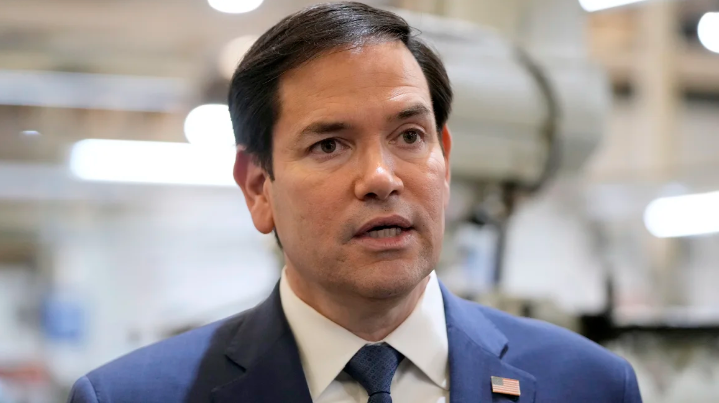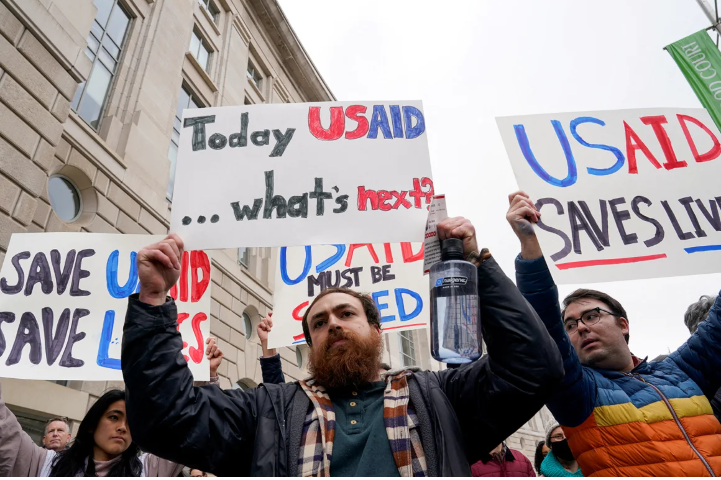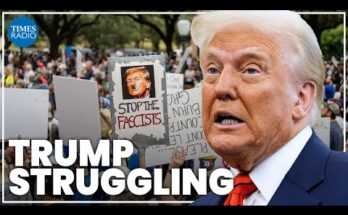
Secretary of State Marco Rubio speaks to the media during a visit to aircraft maintenance firm Aeroman in San Luis Talpa, El Salvador, Monday, February 3, 2025.
Mark Schiefelbein/AP
Secretary of State Marco Rubio, now overseeing the embattled U.S. Agency for International Development (USAID), was once a strong advocate for its mission during his years in the Senate. However, his stance has shifted in recent times, aligning with President Donald Trump and his allies as they push efforts to scale back or dismantle the agency. This reversal marks a significant departure from his previous support for USAID’s role in global development and humanitarian aid.
After Elon Musk claimed that former President Donald Trump had approved plans to “shut down” USAID—resulting in hundreds of employees being placed on leave and its funding frozen—Secretary of State Marco Rubio defended the move. Speaking to Fox News on Monday, Rubio accused the agency of functioning as a “global charity,” stating, “They have basically evolved into an agency that believes they’re not even a US government agency.” His remarks signal a sharp departure from his previous stance as a longtime advocate for foreign aid and USAID’s mission.
However, a CNN KFile review of Rubio’s past statements reveals a stark contradiction. For over a decade, he has been a strong advocate for foreign aid and USAID, which, in fiscal year 2023, distributed over $40 billion in aid to more than 160 countries. His recent criticism marks a sharp departure from his long-standing support for the agency and its mission.
Rubio’s recent remarks stand in direct contrast to his years of support and praise for USAID. In fact, in a February 2017 tweet, he defended the agency’s mission, stating, “Foreign Aid is not charity. We must make sure it is well spent, but it is less than 1% of the budget & critical to our national security.” His past statements highlight a significant shift in his stance, as he now aligns with efforts to scale back or dismantle the very agency he once championed.
During his Fox News interview on Monday, Rubio also dismissed concerns that reducing USAID’s presence could create a vacuum for China to expand its influence in developing nations. His remarks come amid broader debates about the strategic role of U.S. foreign aid in countering global rivals, particularly in regions where China has been increasing its economic and diplomatic footprint.
However, just three years ago, Rubio took the opposite stance. In a 2022 letter, he urged the Biden administration to prioritize USAID funding, calling it a crucial tool to “counter the Chinese Communist Party’s expanding global influence.”
A longtime defender of U.S. foreign aid, Rubio had consistently pushed back against criticism of the agency. In multiple past statements uncovered by CNN KFile, he defended foreign aid as both essential to national security and a minimal portion of the overall U.S. budget. His recent reversal marks a striking departure from his previously steadfast support.
Back in February 2013, Rubio firmly defended U.S. foreign aid, emphasizing its strategic importance. “We don’t have to give foreign aid. We do so because it furthers our national interest. That’s why we give foreign aid. Now obviously, there’s a component to foreign aid that’s humanitarian in scope, and that’s important too,” he stated.
His past remarks highlight a stark contrast to his recent criticism of USAID, as he once positioned foreign aid as a key instrument of U.S. policy rather than an unnecessary expense.
Rubio has long defended foreign aid as a critical tool for U.S. national security and global influence. In a 2017 speech on the Senate floor, he stated, “Foreign aid as a part of our overall budget is less than 1% of the total amount the U.S. government spends. I promise you it is going to be a lot harder to recruit someone to anti-Americanism and anti-American terrorism if the United States of America is the reason one is even alive today.”
Two years later, in August 2019, he again pushed back against calls to cut aid, telling the Forum Club of the Palm Beaches, “Anybody who tells you that we can slash foreign aid and that will bring us to balance is lying to you. Foreign aid is less than one percent of our budget. It’s just not true.”
Now, as Secretary of State, Rubio is overseeing a dramatic shift in U.S. foreign aid policy, working to bring USAID under tighter administration control and significantly curbing its independence. On Monday, he announced that he was now acting director of the agency.
USAID plays a crucial role in administering U.S. foreign aid and development assistance. The agency focuses on humanitarian relief, global health, democracy promotion, and economic growth. It also provides disaster aid, combats diseases like HIV/AIDS, supports free elections, and funds education programs in developing nations. However, under Rubio’s leadership, its future direction is now in flux.

People hold placards outside the USAID building, after billionaire Elon Musk, who is heading US President Donald Trump’s drive to shrink the federal government, said work is underway to shut down the US foreign aid agency, in Washington, DC, February 3, 2025. Kent Nishimura/Reuters
In his Fox News interview, Rubio didn’t hold back when criticizing USAID, accusing the agency of using taxpayer funds to “spend it as a global charity irrespective of whether it is in the national interest or not in the national interest.” He went on to say, “There are things that are happening at USAID that we should not be involved in funding or that we have a lot of questions about, but they are completely uncooperative. So we had no choice but to take dramatic steps to bring this thing under control.”
This harsh criticism underscores the significant shift in Rubio’s approach to USAID, reflecting his concerns about the agency’s operations and its alignment with U.S. national interests.
Despite his strong criticism, Rubio also acknowledged that there are aspects of USAID’s work he supports. “There are things that we do through USAID that we should continue to do, that makes sense,” he said. “And we’ll have to decide is that better through the State Department, or is that better through something, a reformed USAID? That’s the process we’re working through.”
This suggests that while Rubio is pushing for a reevaluation of USAID’s role and its independence, he still sees value in certain initiatives the agency handles. The decision of whether to streamline these efforts through the State Department or a reformed USAID remains part of the ongoing discussion.
CNN reached out to the State Department for comment on Rubio’s past statements but did not receive a response.
A CNN KFile review of Rubio’s Senate website highlights the longstanding praise he had for USAID’s global efforts. Over the years, he consistently emphasized the agency’s importance, lauding its work across a wide range of initiatives. Rubio highlighted USAID’s role in promoting global health, supporting democracy, fostering economic growth, and providing humanitarian aid, all of which he viewed as essential to advancing U.S. interests and security. His support for the agency was a key part of his foreign policy stance during his time in the Senate, making his current criticism of USAID all the more notable.
Over the years, Rubio has consistently praised USAID’s global initiatives, highlighting its critical role in tackling some of the world’s most pressing issues. He championed the agency’s efforts in fighting tuberculosis globally, providing hurricane relief to the Caribbean, and supporting maternal and child health programs. He also advocated for USAID’s involvement in humanitarian relief in Colombia, election support in Burma, Mexico, and Latin America, advancing women’s global economic empowerment, combating human trafficking, and promoting internet freedom in Cuba. Additionally, he supported initiatives like expanding access to quality education, aiding Venezuelans fleeing their country, backing democracy efforts in the Indo-Pacific and Iran, reducing violence in unstable regions, and fighting substance abuse in the Philippines.
In a 2012 speech to the Brookings Institute, Rubio stated, “Foreign aid is a very cost-effective way, not only to export our values and our example, but to advance our security and our economic interests.” This view underscored his belief in the strategic value of foreign aid.
As a senator, Rubio also worked to make foreign assistance programs more transparent, introducing legislation in 2013 and 2015 that ultimately led to a version of the bill being passed in 2016.
During his presidential campaign in late 2015, Rubio defended foreign aid against critics, stating, “A lot of times people say, ‘Well, cut foreign aid.’ Foreign aid is less than 1% of our budget. But foreign aid can make a difference when properly used. And if you ever have a chance, travel to the African continent and you will meet people who are alive today because the American taxpayer funded antiviral HIV medications that kept them alive. It will not be easy to radicalize people who are alive because the American taxpayer saved their lives and the lives of their children.”
These past comments reflect Rubio’s firm belief in the power of foreign aid to not only improve lives but also to serve U.S. national interests. However, his recent criticisms of USAID signal a shift in his approach to the agency’s role in global development.


